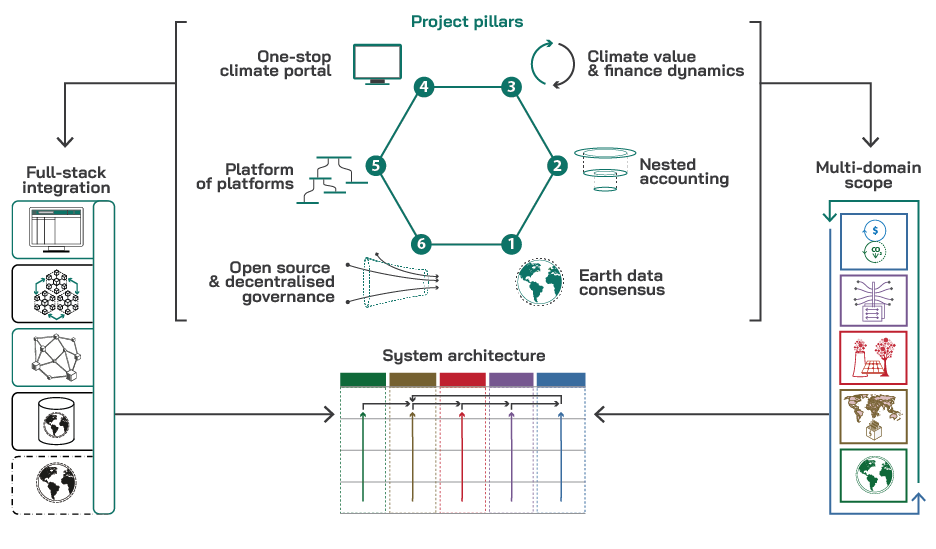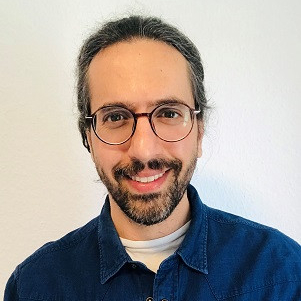“Currently, intellectual and financial capital is still the primary means for corporate valuation, but more and more we will start realizing this falls short since new companies will showcase value growth and impact through collaboration, open source and a growing network effect from shared purpose. The challenge is to capture this and find creative ways to translate this into financial capital, albeit a more enlightned version of financial capital,” says Dr. Martin Wainstein, founder and lead researcher at the Yale University’s Open Innovation Lab, executive director at the Open Earth Foundation, resident fellow at the Center for Business and the Environment at Yale (CBEY) and research manager at MIT Media Lab for its Digital Currency Initiative.
We speak about the Open Climate Collabathon, a new form of event based on a principle of radical collaboration and crowd-development, that calls on everyone to contribute in the development of an open source and collectively owned global climate accounting system, platform and portal.
This interview is part of an ongoing Collabathon Interview Series.
Sebastian Klemm: How do our children survive the 21st century?
Martin Wainstein: At a high-level, by increasing their level of consciousness of how deeply interrelated we all are with our planet, the environment and the human world. This will help them (and us) understand that we are part of the same system, and break down the illusion of separation among us (i.e. what we do to others, we do to ourselves). Practically, our children will thrive by focusing on finding their purpose and the unique talents they bring to the world, and avoid falling into pre-established professional boxes.
https://biomimicry.net/the-buzz/resources/designlens-lifes-principles/
Sebastian Klemm: Based on the recognition that Life on Earth is interconnected and interdependent, Life has evolved a set of strategies to create conditions conducive for life, which have sustained over 3.8 billion years. The so called Life’s Principles state: Be locally attuned and responsive, Use life-friendly chemistry, Be resource efficient (material and energy), Integrate development with growth, Adapt to changing conditions, Evolve to survive.
Now, given that this sustainable world already exists for 3.8 billion years: Where did we get life’s principles wrong? Which concepts, designs or dogmas may have led us in the wrong direction?
Martin Wainstein: Our civilization developed a paradigm of a patriarchal society, favoring dominance and control as a sign of strength —which was driven by higher levels of technological development. No other moment has been more clear of this than in the colonization of the Americas. The mandate developed a ‘humans over nature’ mindset where the responsibility of the more ‘developed’ human was to dominate nature (and less developed societies) for its own development. This lead us to forget that we are an intricate part of Earth and ushered a limitless appropriation of fossil fuels for economic development centuries later. A mindset shift of this magnitude has prevented us from listening to planetary feedback signals. The delicate but resilient Earth system is balanced through system dynamics and feedback, when we block feedback signals, we distance ourselves from these ‘Life principles’ you mention.
[embedyt] https://www.youtube.com/embed?listType=playlist&list=PLDSf5md8xfkgaUEtO0SDbcHvHJpdicyTT&v=3oNrbycIS9s[/embedyt]
https://collabathon.openclimate.earth/collabathon-1
Sebastian Klemm: In your Launch Keynote to the 2020 Open Climate Collabathon you introduced Radical Collaboration as the most important technology to evolve an opensource global climate accounting system as a digital public good and to solve the respective allocation and accounting challenge. As prerequisites for Radical Collaboration you addressed three necessary mindset shifts: 1) We could revise the paradigm of maximized self-interest and evolve an enlightened global self-interest ushered through radical collaboration. 2) We can newly idealize competition to reward collaboration and 3) transform our notion of ownership into stewardship.
Could you elaborate on the Radical Collaboration, inherent mindsets and why it feels necessary now to transcend any prevalent „illusion of separation“ of today?
Martin Wainstein: The three mindset shifts point towards our need for expanding our notion of self, the definitions of who we are —as individuals and as a society. We are not yet a uni-planetary species because we are not operating on that mindset —and thus striving for a multi-planetary civilizations requires us to address this first.
Radical collaboration requires us to break down certain attachments to our egos (individual and organizational) in order to see the collaborating actors as interdependent pieces of the same system. This is needed to help us also let go, trusting that there is more abundance when we operate together than in siloes. Certainly, this is all easier said then done.
Sebastian Klemm: Following this mindshift businesswise: Is the collaborative capital of a company now of equal importance to its intellectual and financial capital? In how far has the ability of being able to add value by collaborating effectively with others become a new business imperative?
Martin Wainstein: This is a key opportunity for innovation, and driven primarily through expanding our notions of economic value, and creating new business models that can operate under those new imperatives. Currently, intellectual and financial capital is still the primary means for corporate valuation, but more and more we will start realizing this falls short since new companies will showcase value growth and impact through collaboration, open source and a growing network effect from shared purpose. The challenge is to capture this and find creative ways to translate this into financial capital, albeit a more enlightned version of financial capital.

The world would not benefit from multiple carbon ledger systems that cannot interoperate with one another. The planet’s atmosphere is still a single limited space where all free greenhouse gases reside. Therefore, an open climate system needs the capacity to involve both existing legacy climate registries, platforms and databases, with blockchain based environments that subsequently should interoperate and reconcile records between each other. This is what underpins that effort on how to design and develop the Open Climate platform should focus on the concept of a platform of platforms (or PoP). The above figure shows the role that this PoP has as a middle layer between legacy and blockchain system, integrating them through protocols and APIs, and representing the collective in the user’s interface. Image: CC BY-NC 4.0

Image: CC BY-NC 4.0
https://openlab.yale.edu
https://collabathon.openclimate.earth/copy-of-about-abstract
Sebastian Klemm: In a nutshell: How did the Collabathon come to be? What is the role of the Yale openlab in the related ecosystem?
Martin Wainstein: The realisation that we need to develop global tools for Earth System management and governance (a core logic of the openlab) implied that these tools need to be shared digital public goods and not centrally owned. To both address this and to leverage the cost of developing these tools (eg. a climate accounting system), I figured we needed to research new scalable models of collaboration and crowd development.
https://collabathon-docs.openclimate.earth/organisation
Sebastian Klemm: The Collabathon is less a competitive hackathon but a vision to engage everyone on a common planetary cause, namely the development of a global open and transparent climate accounting system as a „platform of platforms“.
Could you explain in which ways interested parties can join in and connect with the Collabathon and platform development? Perhaps, as potential End Users (of the platform), Use Case Providers (for the platform), Early Adapters, Contributors (to prompts), Partner, Nodes?
Martin Wainstein: There are several ways to join the collabathon. If you are interested in climate-technology-collaboration, attend one of our Open Climate Dialogues. If you are a climate expert (eg. policy, data, science) or subject domain expert in energy and land-use, then join a team as an domain expert, or even propose a prompt. If you are a software developer, come and hack. If you are a University or Civic Tech group, then join as a node and host a Collabathon instance. If you are neither of the above but want to support the project, then connect with the co-organization team to help in the organization.

The Open Climate Collabathon is an open innovation process organized by an open, transparent and decentralized network (the “open network“). The open network is composed of participants, which can be individuals or organizations. Participant organizations are also called partners. It self-organizes around key structural elements: nodes, teams, prompts. As a new participant, you can create a new node, create or join a team, get acquainted with existing prompts or create and host a new prompt. Image: CC BY-NC 4.0
https://mcc-berlin.net/en/research/co2-budget.html
https://germanzero.de/english-summary
https://unfccc.int/process-and-meetings#:a0659cbd-3b30-4c05-a4f9-268f16e5dd6b
Sebastian Klemm: We share but one single atmospheric CO2e budget worldwide. Talking about applications:
In which ways can the Open Climate Collabathon support a fair allocation of this budget? How can the Collabathon help countries to stay compliant with their remaining share, live up to their nationally determined contributions (Paris Agreement) or climate action plans (like the one by German Zero) and monitor the effectiveness of emission mitigation measures?
Martin Wainstein: The first and most important way to support this is by providing clear values and trusted numbers of the state of the atmosphere as well as the climate action progress of countries. Through technology application and common protocol adoptions, another key value is to reduce the cost of compiling and registering this data. Once a unified and trusted record of these values exist, we can create automated agreements (eg. smart contracts) that allow different incentives or mechanisms to drive an equitable management of the overall budget.
Sebastian Klemm: How can the Collabathon support policymakers at regional, national and international level to incentivize the right assets for effective, sustainable development? Or the other way around: Instead of waiting for the ‘perfect policy’, how can the Collabathon incentivize a bottom-up approach for individuals, firms, organisations, cities, regions to meet their self-defined decarbonisation targets?
Martin Wainstein: By developing technology that allows for trusted climate accounting at the different stakeholder groups (i.e. individuals, companies, cities and regions), we can all share the work of tracking our carbon inventories and climate actions. If we apply nested (jurisdictional) accounting, we directly benefit each higher jurisdiction by allowing the roll-up of climate accounting, and a more participatory in achieveing the NDCs or regional targets.
Sebastian Klemm: How do we design sustainable tech sustainably in itself: Could you highlight some of the innovative ideas that already arised from the community in the Collabathon prompts so far? For example, I saw developments on smart contracts that automatically offset their own carbon footprint.
Martin Wainstein: Some exciting development emerged in the form of a consumer disclosure and supply chain framework, developing a web app so that consumers can have better clarity of the emissions and climate impact of the products we buy (eg. through e-commerce) and allow these consumers to directly offset them at the checkout cart. Other developments include robust prototypes of a Climate Terminal, that would aid on an integrated approach to climate finance and markets (eg. similar to the Bloomberg Terminal). The community also started to work on a smart contract for the Paris Agreement.
https://collabathon.openclimate.earth/sponsor
Sebastian Klemm: The 2020 open climate Collabathon is an open collective, fiscally hosted by the Open Collective Foundation, where the Collabathon’s finances are transparently opened to the community.
Could you elaborate on the reliance on sponsorship to keep the movement going? Which support are you currently seeking?
Martin Wainstein: The community has shown that it can run on itself, simply by the power of volunteers working on a common cause. However, in order to scale and provide a better user experience to participants, funds need to be allocated to improve the digital infrastructure, and allow for testing crowd work programs, where specific skills or tasks are required in the lead up to a Collabathon sprint, and these efforts could be remunerated as a form of empowering contributors to see crowd work as eventually part of their work. This is definitely in early research phase, but I am particularly interested in figuring out how to best create shared value as well as economic development for the community. That is the logic of a decentralised organization. Governance mechanisms are key, and developing them is a key output of the collabathon.
contact: collabathon@openclimate.earth
youtube: Open Climate Collabathon
weblinks:






